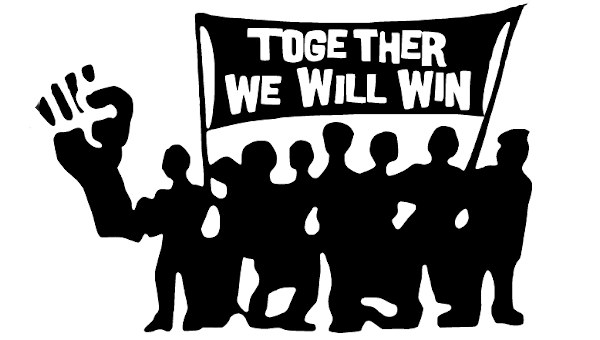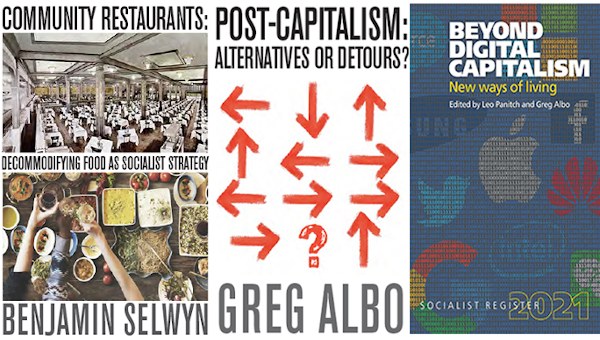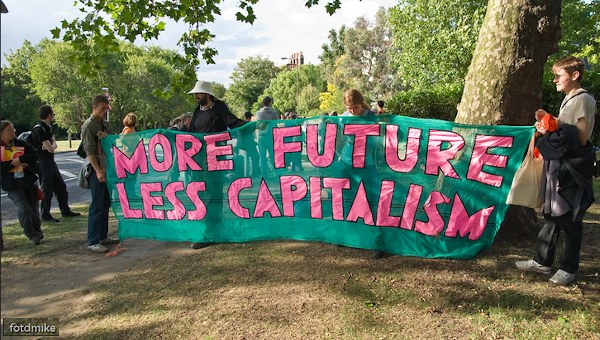A discussion with Richard Swift
Montreal Serai had the opportunity to discuss SOS: Alternatives to Capitalism – a handy, slim compendium of vital, essential thoughts and discussions on the concept of an alternative economy and society – with Richard Swift. His new book has been brought out by BTL (Between the Lines) and New Internationalist Publications and has been excellently received in various circles, both academic and activist. He was interviewed by Rana Bose, co-editor of Montreal Serai where it was first published.
Rana Bose (RB): Capitalism re-invents itself often. Even if the world dies, capitalism makes it through in some other metaform. Capitalism has never really been on its death bed. Imperialism has been and is. I recently heard Ron Paul dismiss any criticism of Capitalism, as “Oh! That’s all crony capitalism that’s terrible. I am for free market capitalism.” You talk about pre-capitalist communitarian alternatives. Can you elaborate on that further, as it relates to advanced industrial nations, like Canada? Can the alternative communitarianism displace ‘free market’ capitalism when it comes to meeting the consumption needs of a large middle class and working poor?
 Richard Swift (RS): Well a few points I guess. I think Capitalism has a strong utopian streak à la Ayn Rand. So that when Ron Paul talks about capitalism as the ‘perfect market’ it is something that has never existed and can never exist. All capitalism is crony capitalism just that some forms of it are more overt than other forms. Once you have a system based on everyone seeking individual advantage you have an in-built tendency toward monopoly and the arbitrary use of power. These will always tilt the market against those without the means to compete. The world economy dominated by transnational corporations cannot ever allow the kind of competition of small holders that is the basis of market utopianism.
Richard Swift (RS): Well a few points I guess. I think Capitalism has a strong utopian streak à la Ayn Rand. So that when Ron Paul talks about capitalism as the ‘perfect market’ it is something that has never existed and can never exist. All capitalism is crony capitalism just that some forms of it are more overt than other forms. Once you have a system based on everyone seeking individual advantage you have an in-built tendency toward monopoly and the arbitrary use of power. These will always tilt the market against those without the means to compete. The world economy dominated by transnational corporations cannot ever allow the kind of competition of small holders that is the basis of market utopianism.
The communal traditions that predated or coexist (still coexist) with capitalism are means of recognizing that there are limits to the domination of economic life over all other forms of life that capitalism adamantly insists on. If we free life from the domination of the economy we open up the possibilities for a richer more multiple life than the mere seeking of individual advantage. The economy and provision for people’s needs (but not their fantasy desires) still exists but is not the total measure of progress. Other criteria for measuring progress come into play: sustainability, well being, conviviality, fraternity and sorority, equality and liberty in a real sense are given space where previously they had been strangled by the domination of all things economic. The economy becomes embedded in society rather than dominating and disciplining it. There are many thinkers from Karl Polyani to Andre Gorz as well as countless communalist traditions that have championed this course. It does not answer all problems but there is no reason to believe that this kind of ‘servant economy’ rather than a ‘master economy’ could not meet the needs of billions of people. We would have to however abandon many of the consumer fantasies of speed and power that occupy so much psychic space under the current system. No room for jet skis I think.
RB: Understandably you draw a lot from the anti-globalization movement, the Occupy movement and the history of classic anarchist history regarding the state and its dissolution as opposed to the traditional Leninist concepts of ‘overthrowing the Czars’ through an act of organized revolution by an organized party. Do you think fundamental social change is possible through grassroots democratic movements as opposed to let’s say parliamentary elections or insurrectionary means?
RS: I think I would resist choosing but have a bias for the recreation of society and democratic power from below. I can see a place for both parliamentary activity and insurrectionary acts but as subordinate to the cause of this grassroots recreation. There are already the germs of an alternative that exist in a wide variety of neighbourhood and cooperative associations that have an ethos of solidarity fundamentally at odds with capitalism. They are one part of what makes up what the radical anthropologist David Graeber calls the ‘baseline communism’ of mutuality without which society capitalistic or otherwise could not exist. If we all treated each other on the strict basis of competitive advantage – friends, families, lovers, neighbours even strangers – there would not be enough cohesion to keep society together.
That said, I think capitalism has a profoundly deforming effect on ever oppositional tendency though the spreading of careerism, corruption and authoritarianism. The parliamentary Centre-Left has more or less abandoned even a modest social democratic transformation in favour of running the neoliberal austerity regime in a slightly more humane way and moderating the ecological crisis through regulating corporate excess. The Leninist Left, where it still exists, has a strong tendency toward becoming an authoritarian cult obsessed with becoming the ‘leaders’ of a post-capitalist society. Where this spills over into to insurrection rather than simply political correctness it becomes coloured by militaristic thinking. The advantage of grassroots democratic movements and their political and economic projects is that they prefigure what a post-capitalist society could look like. Both parliamentary and insurrectionary routes put this off in favour of a ‘transition’ phase shaped either by accommodation or authoritarianism. This said there are of course countless problems to overcome by any strategy dealing with a capitalism deeply embedded not only in our social structures but in our psyches as well.
RB: Do you think that it is possible to achieve a co-existing alternative society – in harmony with nature, ecologically – while capitalism is in full operation, elsewhere and around – espousing runaway growth and ‘trickle down’ wealth as panacea? I am talking about the whole world, including ‘underdeveloped nations’ as the basis for a political philosophy for change and not simply isolated attempts at communes and utopian cooperatives in advanced capitalist countries. Can an alternative to capitalism succeed in a ‘globalized’ market place?
RS: No, I think building a fully functioning co-existing alternative within globalized capitalism is neither possible nor desirable. I think the building of an alternative (if it is to be more than a set of safety valves) needs to be in constant tension and struggle with the existing system. I feel the momentum and power of capitalism is such that it will deform any alternative that is not consciously struggling against it. You can already see this in the way many cooperatives and credit unions have adjusted to business-as-usual. Still there are literally millions of such projects – more people take their livelihoods from coops worldwide than from transnational corporations – that contain in one way or another the potentials for a democratic alternative. These are possible sites of learning the abilities and ethics of a self-managed future. But this can only be accomplished in a situation where the generalized need for an ecologically sane and equal alternative to capitalism is widely recognized.
RB: How would you propose that the state of Canada dissuade itself from its current growth pattern and allow for such concepts to evolve, co-exist, without an ‘overthrow or regime change’? Is it a process of democratization of the decision making process? How can that be initiated and achieved?
RS: I think the current Stephen Harper regime is antithetical to any notion of fairness and humane survival. In the present world it represents the very worst of anti-ecological neoliberalism. So in the small space allowed to us in our system by the professional political class I would vote for whoever to bring it down. That of course does not get rid of capitalism which can be comfortably presided over by a Trudeau or a Mulcair. But it makes us a little less back on our heels resisting Harper’s particular brand of predatory extractivism. Although I am not a pacifist I think the notion of regime change/overthrow are I think old school fantasies about some magical ‘night of the barricades’. They will result in a repressive bloodbath no matter who wins. The repressive technologies at the disposal of the state are truly frightening and there are many in the security forces eager to use them.
Instead I would propose a ‘long game’ where we work in and against the state in order to disperse power. In our current situation, the state that is supposed to ‘represent’ society actually occupies it as an alien force a great deal of the time. The police conducts sweeps in communities of colour just like the military do in Iraq or Afghanistan. They are starting to use the same technologies of repression and surveillance as if the state were at war with society. What we need to do is to embed the power of the state back into society as a way of achieving democracy beyond the nation state. The achievement of this will be a multiple and complicated matter involving the end of the economy as the kind of separate autocratic sphere and a radical decentralization of political power. ‘How’ is a complex question for which I have no easy formulas. But as Paulo Freire used to like to say “the path is made by walking”.
RB: You highlight the discussion on Growth versus Limits to Growth excellently. Tell us something about that and notions of ‘Eco-socialism’ that you discuss in your book. Are we really facing an ecological Armageddon?
RS: I think maybe Armageddon might be over-egging the pudding. If you look at all the most conservative projections of climate change scientists though you will find that we are heading in an unsustainable direction. But the evidence on the ground is uneven and incremental. So it is hard to convince people this is true because for most people most of the time normal life continues – especially in the affluent North. But the evidence of extreme weather, environmental refugees, desertification, species extinction, soil and fishery depletion are there for those who care or dare to look. Without some exit strategy from capitalism it is heading in the direction of a society based on lifeboat ethics where the one per cent and their acolytes live in the equivalent of gate-guarded communities surrounded by the desperate and resource poor. Already it is claimed that the world’s 300 wealthiest families own more than the bottom three billion people. This is simply insane. I think some form of eco-socialism is our best hope. It is the only possibility that allows us to live within our ecological means in a planned and democratic fashion. It has the potential for giving a rich life in the fully humane sense where we can self-rule without being plagued by economic insecurity. It’s both incredibly complex and incredibly simple. The neoliberal economists would have us grow the pie ever bigger but we need a paradigm shift that focuses on making the pie tastier, making sure it is made from healthier ingredients and that it is evenly shared.
RB: You give a lot of impetus to reviving the notion or at least imploring the reader to once again believe in Utopia. “Another world is possible.” Tell us about some concrete situations where you think this thought process has matured and is taking the shape of movements.
RS: Well there are a myriad of movements and communities around the world that are working to build an alternative. The degrowth movement and the slow food movement are two interesting and lively examples. In addition, the fight against austerity in Southern Europe in particular with the formation of the Podemos party in Spain and the Syriza in Greece are both gathering points for an exit from capitalism. In Latin America there is the Bolivarian pole of opposition which has had mixed results but has gone much further than the Centre-Left in most other places in rethinking democracy and reimagining the economy. The people of Latin America do not take the promises of these governments at face value but push hard for them to keep their promises. The movements in Brazil at the time of the World Cup are a good example. There are the intellectual achievements in many fields most particularly ecological economics which challenge the paradigm of capitalist growth. Aside from this there are eco-communities, alternative energy projects, thousands of on-line sites, indigenous initiatives all over the world, those that fight to defend and expand a democratic commons – the problem is not a lack of alternatives but how they can interact creatively to gather enough critical mass to be an effective challenge to our predatory economy and the political class that presides over it.
RB: In your book you state that the Gini Index for Venezuela had dropped five points to 40.99 per cent by 2008, whereas in the U.S. it had gone up to nearly 47 per cent. The Gini Index is a measure of inequality in society. Do you have comparable figures for Canada? Has Canada under Harper become more of an unequal society?
RS: Income inequality in Canada has increased since the 1990s quite dramatically. Not just under Harper but under the influence of Liberal finance minister Paul Martin as well. The richest one per cent of Canadians took one third of all income gains between 1997 and 2007. Now Canada ranks as the sixth least equal of the 17 industrial economies.
RB: Are you proposing a sort of post-anarchist left libertarian eco-socialism from below as a possibility for your readers and the world to consider?
RS: Yes, I think that sums it up pretty well. Although I would say that while we need to reinvent how we govern ourselves, this cannot likely be entirely a bottom up process, but one that is aided, needs encouragement from an hospitable public policy framework. To do this we need to move beyond the anti-politics of pure resistance to struggle on the terrain of the state.
RB: You have touched upon a vast array of subjects-historical errors, economic downturns, ideological fissures and suggested many ways of believing in a better way out for our “sad and beautiful world.” You have not, however, touched two subjects that I am concerned about. First: How do you compensate people for the work they do? What is the value of the addition they contribute to and how can a ‘worker’ stop working so that there is leisure and liberation after he/she has been duly compensated? Second: Capitalism definitely induces innovation, the quest to be productive, efficient and cut out process waste. How can the alternative to capitalism achieve the same inspired vision?
RS: Well I think that I probably didn’t do the second, but on the first, my emphasis is not on the struggle over just wages which I regard as absolutely necessary but remaining within the realm of control by capital. I think we need to find an exit from the centrality of the wage labour system as the main way of distributing wealth throughout society. This is where I see the notion of a basic income (a subject of renewed debate these days) as a means of exit from a world controlled by capital and the provision of ‘jobs’. It is only in this way that we can choose what and how to produce as free producers which is after all what the socialist vision (if not its actual practice) aspires to. I realize that even if we get beyond job blackmail we still need to figure out a system for rewarding people’s efforts, but this shifts the leverage from capital to labour which will have a much greater say in working out arrangements that work both for producers and society as a whole. Also it means that at least potentially, people will have a greater role in refusing unecological and unnecessary work. Andre Gorz estimates the work week could be reduced to about 20 hours if this set of arrangements were adopted. I think what you say about technological innovation and capitalism is true enough. But I think the quest for profitability and the speed in such innovation leads to a recklessness particularly when it comes to ecological consequences. I think with this, as with much else that we do, if we could slow down and be more thoughtful, it would be of great potential benefit.
RB: Thank you for this discussion. In this age of ‘rock star’ economists like Picketty, you have come forward with an illuminating compendium of what is possible, inciting the reader to read-up on history from the Paris Commune to the present, being critical and hopeful in a most convincing way.
RS: Most welcome. Keep up your fine work in Serai. •





